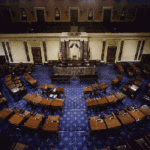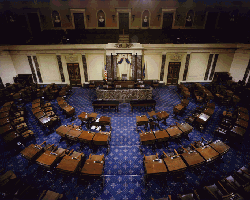
Higher education and K-12 activist groups have stepped up their support in recent days for President Obama’s student lending reform legislation, which has stalled in the U.S. Senate while high-ranking Democrats consider passing the reform package with a simple majority vote.
Days after one of Obama’s signature proposals was said to be in trouble on Capitol Hill, reform advocates were energized March 12 by news that Democrats could pass the Student Aid and Fiscal Responsibility Act (SAFRA) alongside health care legislation through a process known as reconciliation, which doesn’t require 60 votes to avoid a filibuster in the Senate.
The student lending overhaul—pushed in recent weeks by Education Secretary Arne Duncan—would allow the federal government to lend money directly to students, instead of having students go through commercial lenders. Duncan said SAFRA would save taxpayers $87 billion over 10 years by doing away with subsidies to private lending companies, who then tack on interest to student loan payments.
With the fate of SAFRA in the balance, supporters of Obama’s student lending plan are applying new pressure to legislators.
Campus Progress, part of the Center for American Progress, said in a March 12 open letter to Congress that private lenders’ last-minute lobbying efforts have turned some senators against the bill, which the group lauds as a “common-sense plan that would cut government waste, make college more affordable for hundreds of thousands of people, invest in our schools, and expand our economy.”
“Since there is already a shortfall in the Pell Grant program that SAFRA would help make up, the price of heeding [private lenders’] opposition to student loan reform is 500,000 low- and middle-income students losing their Pell Grants at the same time that state budget cuts make tuition costs soar,” Campus Progress said in its letter to members of Congress, referring to the automatic increase in Pell Grants included in the lending bill.
Democrats on the fence about the lending bill have said in recent weeks that SAFRA would increase the national deficit during an era of record-breaking debt. Campus Progress officials refuted these claims, echoing Duncan’s stance that federal projections show billions of dollars in savings over the next decade when compared with the current Federal Family Education Loan (FFEL) program.
“Switching from the FFEL student loan program to direct lending by itself will reduce, not increase, the deficit,” the group said. “Members of Congress who defend FFEL are acting to increase the deficit.”
K-12 groups have joined the student lending reform fray, too, including The First Five Years Fund, a Chicago-based early-childhood learning organization.
Cornelia Grumman, executive director of The First Five Years Fund, said elementary education would benefit from the savings provided by SAFRA if Congress passes the bill.
The student loan reform bill includes $10 billion for an Early Learning Challenge Fund designed to spur competition for early-education providers.
“Here’s the choice: Senators can align themselves with some of the nation’s richest and most powerful banks, whose lobbying machines have been in overdrive,” Grumman said in a March 11 statement. “Or they can decide to use these savings to ensure a more promising economic future through a better educated workforce. The return on these investments for children and communities [is] significant, lasting, and unquestionable. It’s that simple.”
Sallie Mae, the nation’s largest provider of private student loans, has responded to charges that the company had ramped up lobbying efforts to undercut support for SAFRA. In a statement issued last month, the company said it supports key pieces of Obama’s legislation, including “government ownership of all federal student loans and elimination of lender subsidies.”
“We believe, however, that the president’s proposal could be enhanced in a way that preserves private-sector competition,” Sallie Mae said in its statement. “We are disappointed there has not been more debate on these important issues. Congress has held one hearing on reform and considered only the government takeover proposal.”
Sallie Mae spent about $3.5 million in lobbying efforts last year, an increase from $3.2 million in 2008, according to the Center for Responsive Politics, a national research group that tracks trends in lobbying.
SAFRA seemed to be on the verge of passing last fall when Duncan sent a letter to 3,500 colleges and universities in October, urging them to “ensure uninterrupted access to federal student loans by ensuring your institution is direct loan-ready for the 2010-11 academic year.” Since then, more college leaders have moved to a direct-lending model.
Duncan said in a Feb. 17 conference call with reporters that there are more than 2,300 campuses that offer direct lending, up from 1,000 in 2007.
In a March 12 column on The Huffington Post, Duncan addressed recent student protests in California and other parts of the country after states announced tuition and fee increases for the coming year. Duncan pointed to college students’ economic crunch during the recession, and he joined SAFRA advocates with his continued push to pass the overhaul while the political will exists.
“We cannot let this opportunity slip away,” Duncan wrote.
Links:
Arne Duncan’s Huffington Post column
- Research: Social media has negative impact on academic performance - April 2, 2020
- Number 1: Social media has negative impact on academic performance - December 31, 2014
- 6 reasons campus networks must change - September 30, 2014
